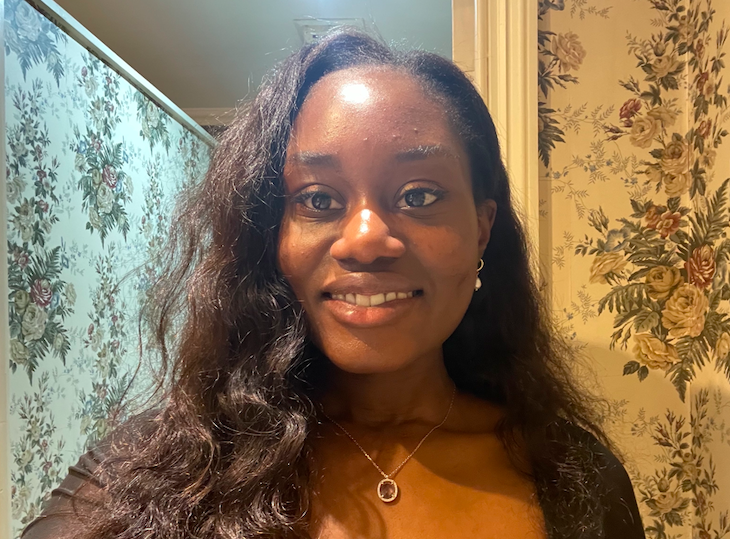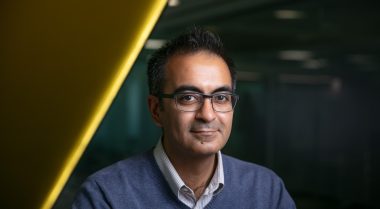Black internship paves the way for pre-term birth PhD research
16 March 2023
Fewa Laleye is a PhD student carrying out research to help predict which mothers are most at risk of pre-term births - helping ensure they receive the best care. An alumnus of the HDR UK Black Internship Programme, she is inspired by the potential for using clinical data to build predictive models in all areas of healthcare.
Over the next three years Fewa Laleye will be using clinical data and biological information for research aimed at helping predict which women are at risk of pre-term births.
 It’s a prime example of how health data science has the potential to transform care, opening up a multitude of possibilities for achieving the best outcomes for women and babies.
It’s a prime example of how health data science has the potential to transform care, opening up a multitude of possibilities for achieving the best outcomes for women and babies.
Fewa, from London, is carrying out the research as a PhD student at King’s College and hopes it will provide a superb start to a career in health data science. When invited to interview, Fewa was able to say she had just been accepted onto the 2022 HDR UK Black Internship Programme – something she believes was helpful in securing a place at King’s.
She said: “I mentioned that this was what I would be doing over the summer, which was a good selling point as it showed I was really interested in this career route.”
Back in secondary school Fewa had gravitated towards maths and the sciences. This, in turn, led her to take a first BSc degree in Biochemistry at the University of Southampton followed by a Molecular Medicine MSc at Imperial College, London. At this stage it was lab work that mostly interested her and the whole scientific process of asking a question, then designing and conducting an experiment to find the answer.
Alongside this, Fewa found herself increasingly fascinated by genetics, epigenetics and the study of genomes to better understand genetic diseases. Following her master’s she went to work at NHS Blood and Transplant where she was involved in investigating the use of different sequencing technologies to improve blood donor matching.
Through this was work, Fewa became increasingly exposed to the use of computer technologies and data for healthcare research.
She says: “I was naturally curious about how we analyse high throughput data. And we are now in this new age where we have access to so much data – how we analyse that and gain meaning from it seemed quite interesting.”
Being highly self-motivated she decided to act on this growing interest and learned the coding language R in her spare time.
However, Fewa felt that what she really needed was formal training. At that point she came across the HDR UK Black Internship Programme – which provides a practical, research-based introduction to health data science – and decided to apply.
“It really aligned with my interests. And I thought this would be the perfect step towards gaining an insight into what this kind of career entails and to learn more about health data research,” she said.
The internship provided everything Fewa had hoped. She spent two months working with Dr Segun Fatumo at the Uganda Research Unit, at the London School of Hygiene and Tropical Medicine, whose role involves a great deal of computational biology.
In her placement, Fewa was contributing to genomic research into cardiovascular disease (CVD) and stroke in African populations. This included research to identify which genetic variants might be responsible for a particular phenotype in a disease.
The practical value lies in helping to find out whether existing drugs used to treat CVD could be repurposed to treat stroke patients. If so, it could save a great deal of money by avoiding the need to develop new treatments.
Fewa also enjoyed the career and networking sessions which allowed interns to meet people from all branches of health data science and get insights into their careers.
Having taken part in the internship programme she is also eligible to join the HDR UK Alumni Network which exists to provide networking opportunities, mentorships, discussion forums, events and other support.
Looking to the future Fewa feels that she has found the area she wants to work in: “I like bioinformatics and how we can use clinical data to create models to help predict and better understand different risks associated with different diseases and help better manage patient care. That’s something I’m definitely interested in.
“Hopefully, I can build my skills and learn more about the statistical aspects of understanding and interpreting data and more about the programming languages and data technologies like machine learning that can help us do this.”
- Find out more about the Alumni Network here.



